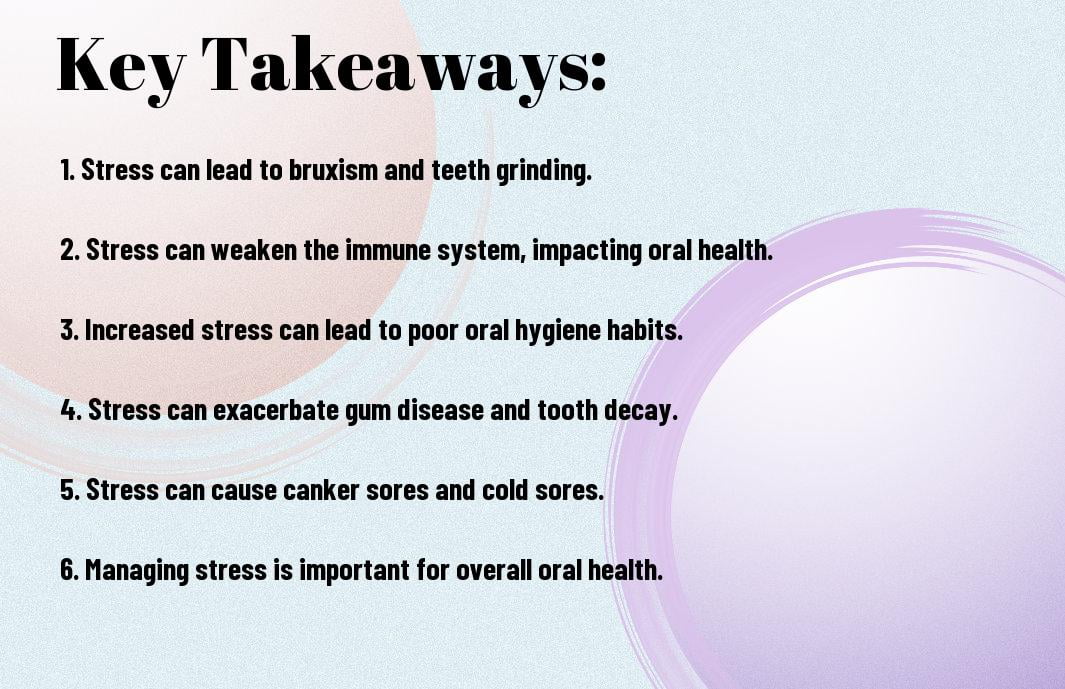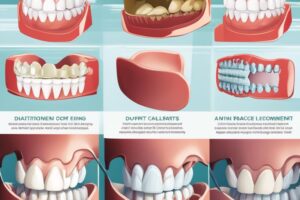Did you know that stress can have a significant impact on your oral and dental health? It’s true – the effects of stress go beyond just mental and emotional strain, they can also harm your teeth and mouth. Chronic stress can lead to an increase in bruxism, or teeth grinding, which can cause irreversible damage to your teeth and even lead to jaw disorders. Furthermore, stress can weaken your immune system, making you more susceptible to oral infections and gum disease. In addition, stress-related habits such as poor diet and neglecting oral hygiene can further exacerbate these issues. It’s crucial to be aware of the impact that stress can have on your oral health and take proactive steps to mitigate its effects.
Key Takeaways:
- Stress can lead to poor oral hygiene: Increased stress levels can lead to neglecting oral hygiene habits, such as regular brushing and flossing, which can result in dental issues like cavities and gum disease.
- Bruxism is a common stress-related dental issue: Stress can cause individuals to involuntarily clench or grind their teeth, leading to issues such as tooth wear, jaw pain, and headaches.
- Stress can weaken the immune system: A weakened immune system from stress can make it harder for the body to fight off oral infections, such as gum disease and canker sores.
- Stress may lead to dry mouth: Stress can reduce saliva production, leading to dry mouth, which can increase the risk of tooth decay and oral discomfort.
- Seeking stress management techniques is crucial for oral health: It is important for individuals to find healthy ways to manage stress, such as exercise, meditation, and seeking professional help, to prevent negative impacts on their oral health.
Biological Mechanisms
While stress can impact many areas of your health, it also has a significant influence on your oral and dental health. Understanding the biological mechanisms behind this connection can help you take steps to mitigate the effects of stress on your mouth and teeth.
The Role of Cortisol
When you experience stress, your body releases cortisol, a hormone that helps you cope with the situation. However, prolonged periods of elevated cortisol levels can weaken your immune system, making you more susceptible to gum disease and other oral health issues. Additionally, cortisol can lead to increased inflammation in your body, which can exacerbate existing dental problems.
Stress Response and Oral Health
Your body’s response to stress can also manifest physically in your mouth. You may find yourself grinding your teeth or clenching your jaw, which can lead to tooth damage and muscle tension. Furthermore, stress can affect your oral hygiene habits, leading to neglect of your regular dental care routine. This can result in an increased risk of cavities, gum disease, and other dental issues.
Stress and Oral Health Conditions
Despite being a seemingly unrelated issue, stress can have a significant impact on your oral health. There is a definitive link between stress and oral health, which has been thoroughly examined by dental professionals. You can find more information on these links in this article.
Periodontal Disease
One of the most significant oral health conditions linked to stress is periodontal disease. When you are stressed, your body’s ability to fight off infections is compromised. This can lead to an increased risk of developing periodontal disease, which can have serious consequences for your oral health. It is important to be aware of the potential impact of stress on this condition and take steps to manage it effectively.
Tooth Grinding (Bruxism)
Another common issue related to stress and oral health is tooth grinding, also known as bruxism. When you are stressed, you may be more likely to clench or grind your teeth, especially during sleep. This can lead to excessive wear and tear on your teeth, as well as jaw pain and headaches. It is essential to address any underlying stress and implement strategies to reduce tooth grinding to protect your oral health.
Preventive Measures and Treatments
After understanding the impact of stress on your oral and dental health, the next step is to take preventive measures and seek appropriate treatments to minimize the damage. Here are some strategies to help you maintain good oral and dental health in the face of stress.
Stress Reduction Techniques
Stress can take a toll on your oral and dental health, so it’s important to incorporate stress reduction techniques into your daily routine. Practices such as deep breathing, meditation, yoga, and regular exercise can help alleviate stress and its impact on your oral health. Additionally, seeking professional help from a therapist or counselor can also provide you with effective coping mechanisms to manage stress and protect your oral and dental well-being.
Dental Interventions for Stress-Related Conditions
In some cases, the impact of stress on your oral and dental health may require dental interventions to address specific conditions. For example, if you are experiencing teeth grinding or jaw clenching due to stress, your dentist may recommend a custom night guard to protect your teeth from damage. Additionally, if stress is causing you to neglect your oral hygiene, leading to gum disease or tooth decay, your dentist can provide treatments such as professional cleanings, fillings, or periodontal therapy to restore your oral health.
Remember, taking preventive measures and seeking appropriate treatments is crucial in combating the negative impact of stress on your oral and dental health. By incorporating stress reduction techniques and seeking dental interventions when necessary, you can protect yourself from the harmful effects of stress and maintain a healthy smile.
The Impact Of Stress On Oral Health And Dental Health
The effects of stress on your oral and dental health are significant and should not be overlooked. Chronic stress can lead to a myriad of oral health issues such as teeth grinding, clenching, and gum disease. It is important for you to be mindful of your stress levels and take proactive steps to manage and reduce it. By practicing stress-reducing techniques and maintaining good oral hygiene, you can help mitigate the impact of stress on your oral health and ensure that your teeth and gums remain healthy and strong.
FAQ
Q: What impact does stress have on oral health?
A: Stress can impact oral health in several ways. Chronic stress can lead to teeth grinding, jaw clenching, and can increase the risk of developing gum disease and dry mouth. Additionally, stress can weaken the immune system, making it harder for the body to fight off oral infections.
Q: How does stress affect dental health?
A: Stress can affect dental health by increasing the likelihood of developing dental issues such as cavities, gum disease, and can even lead to tooth loss. People under stress may also neglect their oral hygiene, leading to an increase in plaque and tartar buildup, which can result in more serious dental problems.
Q: What can be done to mitigate the impact of stress on oral and dental health?
A: To mitigate the impact of stress on oral and dental health, individuals can practice stress-relief techniques such as mindfulness, meditation, and exercise. Additionally, maintaining good oral hygiene habits, visiting the dentist regularly, and seeking professional help for stress management can help prevent or address stress-related oral health issues.







